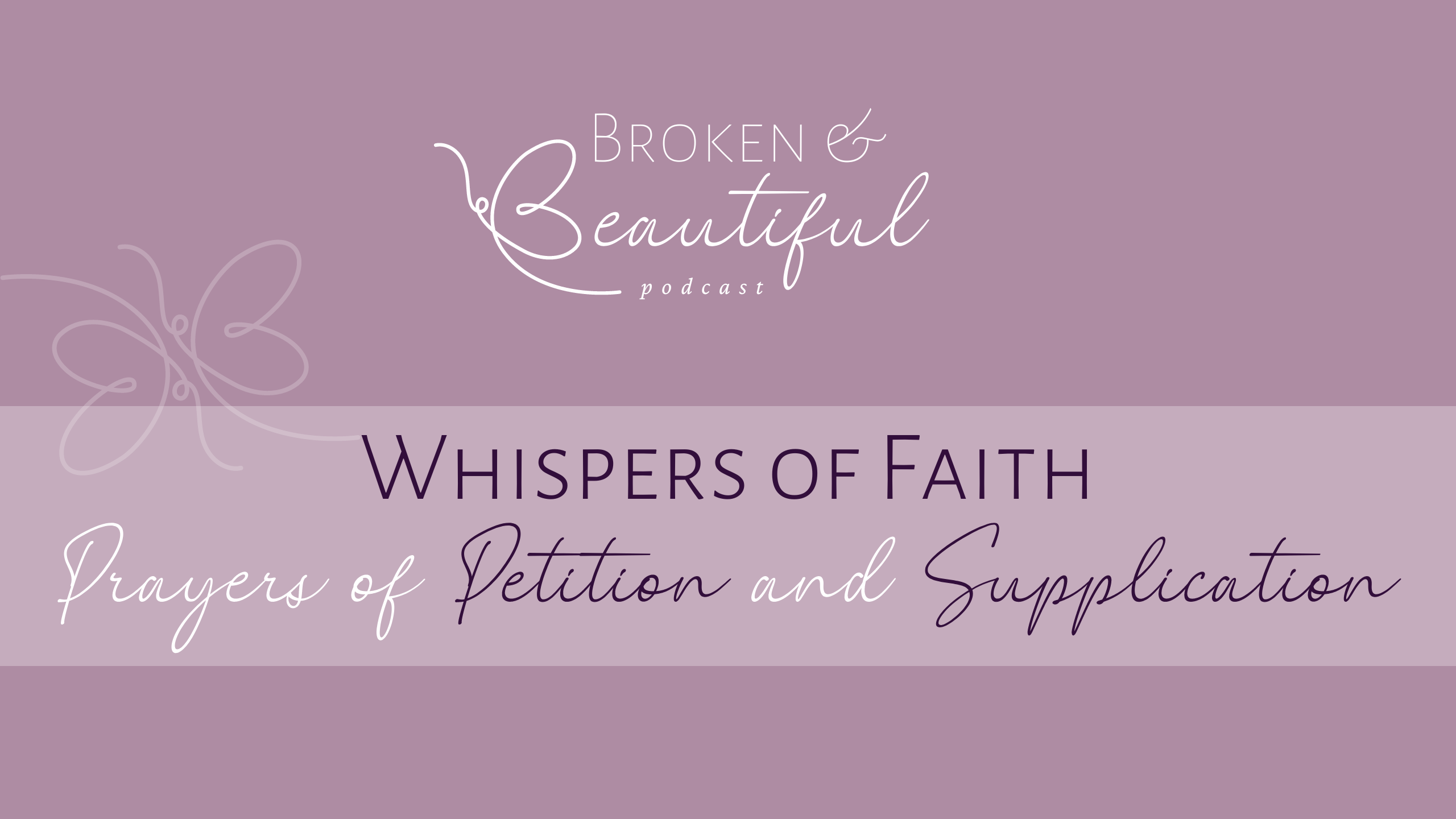When we think about prayer and sharing our requests with God Himself, it seems people tend to err on one of two extremes—either ONLY praying for needs at the expense of all other types of prayer OR believing that to pray for our needs is selfish and should never be done. Neither one of these extremes are healthy or accurate.
I’m so grateful that God continues to teach us how to pray by giving multiple examples of prayers in the book of Psalms.
What Do Petition and Supplication Even Mean?
Growing up in the church and in a Christian family, I realize that I’ve perfected the language of “Christianese.” This language is understood well by everyone on the inside but is quite foreign to those who haven’t yet been exposed to it. We talk easily and freely about words such as “fellowship, atonement, tithes and offerings, quiet time and sanctification.” And we forget that these words aren’t always intuitive for everyone.
Petition and Supplication are two other “Christianese” words that need to be defined, since we’re encouraging you to incorporate them as an integral aspect of your prayer life. Simply put, petition and supplication mean to ask for what you need. The dictionary defines supplication as a humble entreaty. This portion of prayer focuses on outlining before God the specific requests and needs we have.
God as Parent
Many Christians are hesitant to approach God with a list of needs. We tend to tell ourselves (or listen to the lie of the enemy) that God is too busy for our little needs. Or that it’s selfish to be thinking of ourselves when so many have bigger issues across the world. What does our trial really matter in the grand scheme of things?
This thinking is so damaging and dangerous. Thankfully, God doesn’t have rules about what we can and can’t say or bring to Him. He invites us to be real and open and honest – and He receives our petitions and lists and needs as a loving parent receives their child’s needs.
This reminds me of a profound truth Jesus shared,
Which of you, if your son asks for bread, will give him a stone? Or if he asks for a fish, will give him a snake? If you, then, though you are evil, know how to give good gifts to your children, how much more will your Father in heaven give good gifts to those who ask him! (emphasis added)
Matthew 7:9-11 (NIV)
Jesus goes ahead and shares with us the parallel between a parent with a child and God with us. We have permission to use this example to understand that just as a parent wants to give good gifts to their children, so God wants to give good gifts to us! Isn’t that beautiful?!
But did you catch the last qualifying phrase, to those who ask him! He wants us to ask Him for the things we need. There’s a welcoming invitation, if we will just take it.
As a mom to two teenage boys, I treasure every time they want to talk to me, knowing that my days with them at home 24/7 could be short (agh! Don’t make me cry!). I’m obviously not God, because sometimes I do get tired of their constant chatter (keeping it real). But in all sincerity, I do love our conversations together. And when they come to me with a request or something they need, I want to meet that need. Recently, it seems they’re asking for new and larger pants and shoes about every 2 weeks! But they tell me their need and then I get to work to meet the need. It’s my joy and privilege as a parent to fulfill their request.
I believe God feels the same way about us coming to Him. He doesn’t always give us the exact answer we want (and I don’t always give the boys the answer they want), but He always responds. The lines of communication are open.
This is a similar concept in marriage. Strong marriages depend on open, honest communication. Since I’ve discovered my husband isn’t a mind reader, I have to clearly tell him what my needs are. Sometimes the conversations are difficult and hard, but as we work through them, our marriage gets stronger. Our trust with each other is built conversation by conversation. Keeping our needs inside and never speaking them builds resentment and a shallow foundation.
God asks us to ask! We can come boldly before His Throne and ask what we need. Praise the Lord!
Psalm 86—I’m Needy!
This Psalm is a perfect template for us to use as we understand more of what petition and supplication can look like during our own prayer time.
I love verse 1 as it sets the stage for what is to come. David so clearly cries out to God,
Incline Your ear, O Lord, and answer me; For I am afflicted and needy.
Psalm 86:1
King David approaches God with the heart God is looking for—humble, needy, dependent. This is one of the purposes for petition prayer, to remind ourselves and declare to God that we are not complete on our own. We don’t have all the answers. We need. We lack. We are totally dependent on the King of Kings for everything. Petition acknowledges our need and puts us in the position of humility.
David Demands
David asks God for a lot of things in Psalm 86. In our American church culture, being so forward with God feels a little bit uncomfortable. We’ve so watered down the relationship that God is seeking with us. David goes so far as to demand a few things of God—YIKES! How does that feel to you? When was the last time you talked with God that openly and firmly? Sit with that for a few minutes and see how that resonates.
David asks God for a lot of things in Psalm 86. In our American church culture, being so forward with God feels a little bit uncomfortable. We’ve so watered down the relationship that God is seeking with us. David goes so far as to demand a few things of God – YIKES! How does that feel to you? When was the last time you talked with God that openly and firmly? Sit with that for a few minutes and see how that resonates.
So what does David ask for or demand from God in Psalm 86? Here’s the list of his petitions:
- Incline Your ear
- Answer me!
- Preserve my soul
- Save me
- Be gracious to me
- Make my soul glad
- Give ear to my prayer
- Heed the voice of my requests
- You will answer me
- Teach me Your way
- Turn to me
- Give me strength
- Show me a sign for good
This is quite the list to take to God! Let David be an example to us that we can come to God with confidence in what we need. The act of coming to Him is what He is seeking. He can take care of how He responds and how He works in our heart as we come to Him. Let God worry about the outcome – just know you and I can bring our petitions to Him. He wants that.
Petitions and Praise
What I love about this Psalm is that interspersed between a laundry list of petitions, David sprinkles in large amounts of praise to God and for God. In essence, he’s reminding himself that God truly is good and able to answer and meet his needs.
Recalling God’s promises back to Him along with our supplication is a powerful exercise. It gives us confidence that God will answer and act according to His good character. Praise with petition builds our faith and hope. It shows we are expecting and looking for God to move on our behalf.
We come to God with a concern, a need, a petition. And often there are hints of doubt about how the situation can and will work out. We don’t have the answers; that’s why we’re bringing it to the Lord. So when we speak a concern and then follow it up with a reminder of God’s promises or faithfulness or character, we build a level of hope and confidence on top of our request. We leave our prayer time and maybe we don’t have our answer or solution. But we can move about our day with a little more hope and faith because we remembered that every time in the past, God has been faithful, so we know He will somehow be faithful in our current need.
God loves to hear from His children – in the good times and in the bad times, just like a parent loves to hear from their children.
I pray you’ll experience peace as you bring your petitions to the Lord. For more on this subject, you are invited to listen to a podcast Stephanie Feger and I recorded on prayers of petition.
Join us at a 2024 Broken & Beautiful Retreat.
Each retreat explores meaningful topics Christian women face, offering Scripture deep dives, creative therapy sessions, and community time with other women who are on the same broken to beautiful journey. Broken & Beautiful Retreats take place at various locations in Louisville, Kentucky and Southern Indiana.






